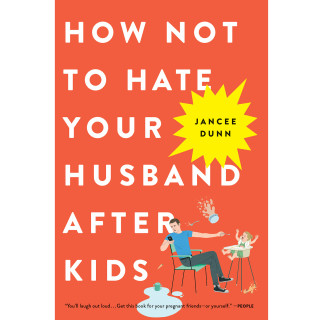6 Powerful Words That Could Save Your Relationship
The author of How Not to Hate Your Husband After Kids learns how a half-dozen small shifts may have a big impact on how you and your spouse get (and stay) in sync.

Photo: akindo/Getty Images
Because
Battling over a household chore? Your request is more liable to be fulfilled if one magic word is used: because. Harvard psychologist Ellen Langer found that people are more willing to comply with an appeal if you simply provide a reason—any reason. Langer observed a group of people waiting to use a copy machine. When someone asked to cut in line, but supplied a reason, even when it didn't make much sense ("can I use the copy machine first because I need to make a copy?") the folks in line were more likely to agree. The word because appears to be the behavioral cue, so even if your reason sounds a little nutty (Please empty the dishwasher because it's full) it can still get results.
But
We've all been told not to use the word "but" for an apology (as in, "I'm sorry, but..."), which comes off as an excuse and feels like a less-than-sincere mea culpa. In a series of experiments, however, psychologists Sandra Murray and John Holmes discovered the word can have a magically protective effect in relationships. They had couples describe their partner's positive and negative qualities. They found that happy duos tended to qualify the not-so-enticing qualities with "but"—what they called "seeing virtue in fault." He's grumpy in the morning, but he always makes me coffee. She's an obsessive neatnik, but I must say, our house is pretty organized. Adopting this habit can help you see your spouse in a more generous, forgiving light.
Ouch
If your partner lashes out, it can be tempting to clap back. But couples therapist Hal Runkel says that if a fight is escalating, one word can quickly tamp it down—and nope, it's not "sorry." It's "ouch." Runkel maintains that saying "ouch" stops your partner in mid-rant by reminding them you're vulnerable, and sends a clear signal that you don't want things to get nastier.
We
When my husband and I were in couples counseling, one therapist gave us a life-changing piece of advice: Attack your problems, not each other. How? One way is to make liberal use of the word we, as in, What should we do about this? Researchers from the University of California, Berkeley, found that couples who used more collective pronouns such as "we" and "our" had more positive interactions than couples who used pronouns like "I" and "you" (e.g., the more finger-point-y: "I think..." or "you should..."). It's an instant way to signal you're on the same team.
Yes
Eminent couples therapist John Gottman, Ph.D. says all of his research findings—and he's been at this for nearly 40 years—can be likened to a metaphor of a saltshaker. Instead of salt, simply fill it with all the ways you can say "yes." Yes, that's a great point. Yes, let's go for a walk. That kind of behavior, he says, is what a good relationship is.
Thanks
It seems a little silly and sometimes, frankly irritating—to have to thank your partner for, say, taking out the trash. But researchers from the University of Georgia studied marriages that last, and found expressions of gratitude were "the most consistent significant predictors of marital quality." If you can keep it up for at least a few months, even better: Psychologist Philip Watkins found that consistently saying thanks creates a reciprocal "cycle of virtue," so that over time, even the less effusive partner will join in. It's the easiest way to show recognition, the relationship version of the delightful Zulu greeting I see you. Small words, big impact, upward spiral.
 Jancee Dunn is the author of How Not to Hate Your Husband After Kids (Little, Brown).
Jancee Dunn is the author of How Not to Hate Your Husband After Kids (Little, Brown).
Battling over a household chore? Your request is more liable to be fulfilled if one magic word is used: because. Harvard psychologist Ellen Langer found that people are more willing to comply with an appeal if you simply provide a reason—any reason. Langer observed a group of people waiting to use a copy machine. When someone asked to cut in line, but supplied a reason, even when it didn't make much sense ("can I use the copy machine first because I need to make a copy?") the folks in line were more likely to agree. The word because appears to be the behavioral cue, so even if your reason sounds a little nutty (Please empty the dishwasher because it's full) it can still get results.
But
We've all been told not to use the word "but" for an apology (as in, "I'm sorry, but..."), which comes off as an excuse and feels like a less-than-sincere mea culpa. In a series of experiments, however, psychologists Sandra Murray and John Holmes discovered the word can have a magically protective effect in relationships. They had couples describe their partner's positive and negative qualities. They found that happy duos tended to qualify the not-so-enticing qualities with "but"—what they called "seeing virtue in fault." He's grumpy in the morning, but he always makes me coffee. She's an obsessive neatnik, but I must say, our house is pretty organized. Adopting this habit can help you see your spouse in a more generous, forgiving light.
Ouch
If your partner lashes out, it can be tempting to clap back. But couples therapist Hal Runkel says that if a fight is escalating, one word can quickly tamp it down—and nope, it's not "sorry." It's "ouch." Runkel maintains that saying "ouch" stops your partner in mid-rant by reminding them you're vulnerable, and sends a clear signal that you don't want things to get nastier.
We
When my husband and I were in couples counseling, one therapist gave us a life-changing piece of advice: Attack your problems, not each other. How? One way is to make liberal use of the word we, as in, What should we do about this? Researchers from the University of California, Berkeley, found that couples who used more collective pronouns such as "we" and "our" had more positive interactions than couples who used pronouns like "I" and "you" (e.g., the more finger-point-y: "I think..." or "you should..."). It's an instant way to signal you're on the same team.
Yes
Eminent couples therapist John Gottman, Ph.D. says all of his research findings—and he's been at this for nearly 40 years—can be likened to a metaphor of a saltshaker. Instead of salt, simply fill it with all the ways you can say "yes." Yes, that's a great point. Yes, let's go for a walk. That kind of behavior, he says, is what a good relationship is.
Thanks
It seems a little silly and sometimes, frankly irritating—to have to thank your partner for, say, taking out the trash. But researchers from the University of Georgia studied marriages that last, and found expressions of gratitude were "the most consistent significant predictors of marital quality." If you can keep it up for at least a few months, even better: Psychologist Philip Watkins found that consistently saying thanks creates a reciprocal "cycle of virtue," so that over time, even the less effusive partner will join in. It's the easiest way to show recognition, the relationship version of the delightful Zulu greeting I see you. Small words, big impact, upward spiral.
 Jancee Dunn is the author of How Not to Hate Your Husband After Kids (Little, Brown).
Jancee Dunn is the author of How Not to Hate Your Husband After Kids (Little, Brown).



